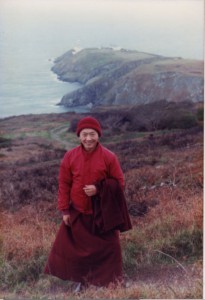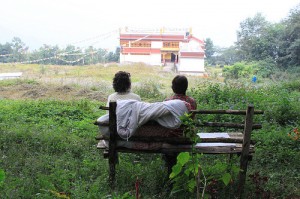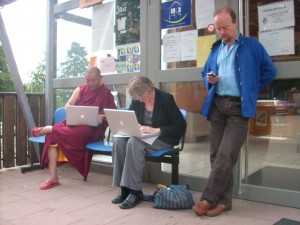 Thank you Rinpoche for agreeing to this interview.
Thank you Rinpoche for agreeing to this interview.
When did you get your ‘wake up call’ to come to the West?
I was asked maybe in the late 70s by the XVIth Karmapa to go to Canada to teach at the university and then later I was asked to go to Naropa university but both times I didn’t go because my studies were not complete in India and also I did not have too much interest actually in going to the West. In 88, I think, I met Akong Rinpoche and Sogyal Rinpoche at a Tulku’s conference in Varanasi and the same day they invited me and they said that there is no need for you to set yourself up in Sikkim all the time, you don’t need to come for the whole time, you just come for a visit, what is wrong with coming for a visit? So I said ‘there is nothing wrong with going for a visit’ so I said ‘ok then, I’ll come for a visit when I have my vacation in Sikkim, which is in the winter’. So I started to work on my passport and things like that. It took more than a year and then I arranged to go to Europe in December at Christmas time of 1989, first to Samye Ling and then to Rigpa. So that was my first visit.
You were mentioning your studies in Sikkim, what were you studying?
Generally I was studying Buddhism, Buddhist studies mainly.
And you also wrote books didn’t you?
Yes I was working there actually; I was working for a long time. When I was 17 in 1969, I was appointed as a Tibetan expert for the government of Sikkim, writing text books for schools for Tibetan language study and also to train the teachers in Tibetan language. I worked for 8 years on this. Then I was offered another job as a professor in the university and was teaching Tibetan as Head of the Tibetan Department, in Gangtok for 17 years, so all together, I was teaching there for 25 years but at the same time I was also studying.
Did you find a need to adjust your communication skills to address westerners? –if so in what way?
My English was kind of different because I knew all the words and how to spell them but I didn’t know how to pronounce them, so I had to learn. Of course I had to learn a lot of things. There is no end to learning.
Would you talk to a Tibetan person in the same way as you would talk to a Westerner?
Not in the same way. Right from the beginning I understood that. You cannot talk in the same way in two different languages to any person.
Could you tell us the Bodhicharya story?
 As I said, in 1989 I came for a short visit during my vacation and then they asked me to come again so I came again next year for a bit longer and then almost every year. And then in 1994, I think, I resigned and retired as a professor of Tibetology in Sikkim. I started to come a bit more to the West and maybe around that time or a little bit afterwards, we found the need to have some kind of organisation to monitor the different kinds of activities that I did, especially my work in Tibet because I was trying to rebuild the monastery there. The organisation was also going to help people to arrange my travels and my teachings here. So that’s how we started Bodhicharya.
As I said, in 1989 I came for a short visit during my vacation and then they asked me to come again so I came again next year for a bit longer and then almost every year. And then in 1994, I think, I resigned and retired as a professor of Tibetology in Sikkim. I started to come a bit more to the West and maybe around that time or a little bit afterwards, we found the need to have some kind of organisation to monitor the different kinds of activities that I did, especially my work in Tibet because I was trying to rebuild the monastery there. The organisation was also going to help people to arrange my travels and my teachings here. So that’s how we started Bodhicharya.
Bodhicharya is a Sanskrit word which actually means bodhisattvas charya, bodhisattvas activities, and it is a very good name maybe a bit difficult for people to pronounce but a very good concept. We have mainly three areas of activities and purposes for Bodhicharya: healing, helping and harmony.
Bodhicharya is actually a network of people: myself, my friends and students and anybody else who likes working together in these three areas for the betterment of the world.
Healing is what I consider to be healing of the mind and the body. Healing of the mind is working on our mind, our emotions, our understandings, our reactions, and our happiness and through meditation and through different kinds of practices and methods, to understand more of the nature of our own mind and our own emotions. This is healing of the mind.
Healing of the body is healing all kinds of diseases and maladies of the body not only through the regular Western medicine but also through alternative ways of healing, alternative medicines and also through different kinds of systems like yoga tai-chi exercises and pranayama, in many different ways like Chinese, Tibetan and ayurvedic.
And then helping is to do something that we know and think will help some people. If we don’t feel that then we don’t feel good with ourselves. We feel that our life is useless or meaningless, purposeless and therefore it is extremely important that we do something in our lives that we know is helpful and beneficial to others. I think this is a very important, and it is part and parcel of the Buddhist understanding. We talk a lot about compassion and things like that so we need to do something. This is not only good for others it is good for ourselves too. I think it is very very important that we try to organise ourselves, that we try to find a way to do something because there are a lot of people who want to do something but don’t know what to do. Helping is one of the main projects, that is, finding ways and means to do things that would help. The second project is to participate in bringing help to others in different ways.
 The third is harmony. I think it is the most important thing especially now because we need peace. We need peace in ourselves, in society, in the world and in the family. To have this kind of peace, we need harmony. Harmony is only possible if we understand each other. We need to have more understanding between different cultures, different religions, different races and different people. The more we understand each other, the more we understand ourselves, our own culture, our own kind of situation and relationships and history and the more we can be broadminded and accept others. We can also learn from others and also we can share our things with others. So now with the communication technologies and all the other technologies the world is becoming so small that if we don’t have this communication then I think we’ll have lots of conflicts. Nobody can be isolated now so I think it is a very important thing to work on these deliberately and in a more focused way. So healing, helping and harmony are the three things we try to work on. There are many different projects going on in different places, some Bodhicharya centres, some Bodhicharya groups, some Bodhicharya members and people who are not necessarily members but who like to work together. The idea is not to create MY kind of special place but to work together in a network of people. That’s Bodhicharya.
The third is harmony. I think it is the most important thing especially now because we need peace. We need peace in ourselves, in society, in the world and in the family. To have this kind of peace, we need harmony. Harmony is only possible if we understand each other. We need to have more understanding between different cultures, different religions, different races and different people. The more we understand each other, the more we understand ourselves, our own culture, our own kind of situation and relationships and history and the more we can be broadminded and accept others. We can also learn from others and also we can share our things with others. So now with the communication technologies and all the other technologies the world is becoming so small that if we don’t have this communication then I think we’ll have lots of conflicts. Nobody can be isolated now so I think it is a very important thing to work on these deliberately and in a more focused way. So healing, helping and harmony are the three things we try to work on. There are many different projects going on in different places, some Bodhicharya centres, some Bodhicharya groups, some Bodhicharya members and people who are not necessarily members but who like to work together. The idea is not to create MY kind of special place but to work together in a network of people. That’s Bodhicharya.
You mentioned the word ‘centre’ and Sikkim is quite far away. Would you envisage having a retreat centre in Europe?
We already have retreat centres in Europe. We have a very nice retreat centre in Lusse in France, about one hour from Strasbourg.
A qualified lama with the Three Heritages and quite a few monks and nuns live there. It is very much a retreat situation because it is in a forest far from the hustle and bustle of the town. Six or seven people are staying there regularly on retreat. It is also possible to have retreat weekends. We are now also working on making provision for people who can stay for longer. In Germany near Munich, we have Bodhicharya Huttenried under the guidance of Ani Karma Tsultrim and they have built facilities to live in the countryside to take longer or shorter retreats. And of course we have retreats in Sikkim.
 And how do you feel about being here in La Petite Pierre in the middle of a mini European community?
And how do you feel about being here in La Petite Pierre in the middle of a mini European community?
La Petite Pierre is a little bit like Sikkim. It is mountainous, with lots of forests and it also rains a lot. It looks and feels like Sikkim. I have liked the idea of having a Summer Camp for a long time because more people can come together and I can teach in a more concrete and continuous way with the same people which is otherwise not so easy to arrange. I travel to a lot of places giving different teachings to different people. Sometimes people can come, sometimes they can’t.
So La Petite Pierre would ensure continuity…
It does not need to be La Petite Pierre. So far we haven’t been able to find a more suitable place so that’s what we have and it’s not too bad. It could be better but at the moment we are doing it here.
Do you think the Dharma is developing in Eastern Europe?
Yes I heard that there is a lot of interest in Eastern Europe. I have also been invited to go to Slovenia, Russia and some other places. I don’t know if you call Poland Eastern Europe or not but it is very very strong in Poland.
Would you like to see a photographic retrospective to mark some kind of anniversary of Bodhicharya because you have students who travel a lot and come back with fantastic pictures ?
Yes that would be a nice thing to do.
Are you thinking of anybody?
I think we just need to collect pictures and make people aware of the idea and then things will come up. It has been my experience that if we have an idea, then we express this idea and then slowly things happen.
 This interview will be published on Many Roads on the new Bodhicharya website. How do you assess the impact of internet on the development of Buddhism?
This interview will be published on Many Roads on the new Bodhicharya website. How do you assess the impact of internet on the development of Buddhism?
I think the internet is full of Buddhist things, with a lot of material. Buddhists have been very active on the internet. We have almost the whole of Tibetan Buddhist literature on the internet, thousands of books, some of them typed, some of them scanned. If you have a small computer you can actually get any book now on the internet. There are also lots of teachings by various lamas from all over the world. You have so many Buddhist sites from different centres and different publications. Many lamas have also started to teach through the internet and it is growing very fast. Even His Holiness the Dalai Lama teaches through the internet. His Holiness the Karmapa has also started. I think it is a very good thing because it is not possible to travel everywhere. It will be very very useful especially for places where there are not so many Buddhists and they can’t invite a lama especially a high lama.
You know that everybody likes your stories, would you have one for us please?
You can never tell a story when somebody says ‘tell a story’!(Rinpoche was laughing)

Leave a Reply